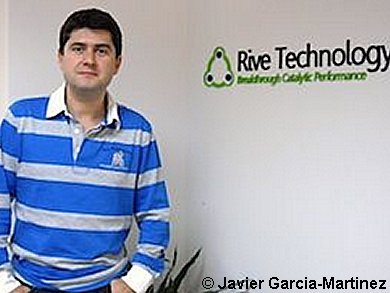Young scientists have to face the difficult task of choosing between a career in either academia or industry, but nowadays there is a third path: becoming an academic entrepreneur.
Javier Garcia-Martinez is professor of chemistry and director of the Molecular Nanotechnology Lab, University of Alicante, Spain, but also co-founder of Rive Technology, Cambridge, MA, USA, a MIT spin-off commercializing his technology. Javier Garcia-Martinez talked with ChemistryViews.org about his experience and about how to become a successful academic entrepreneur.
One of his motivations to do so is that he thinks that science and technology will be critical in our efforts to tackle the most urgent societal challenges. Therefore, we need more people with the courage and technical knowledge to turn discoveries into an everyday reality.
Here are some of the things that he thinks are important for being a sucessful academic entrepreneur:
9 tips to successfully turn discoveries into an everyday reality
Characteristics
- Curiosity.
- Creativity.
- Courage/willingness to take risks.
- Inner drive.
- Rigor.
- Ability to recognize business opportunities and create value for the customer.
Some Tips
- Look for role models early in your career.
E.g., biochemist Herbert Boyer, co-founder of Genentech,
chemist George Whitesides, co-founder of Genzyme and many other companies from his academic bases at Massachusetts Institute of Technology (MIT), and Harvard University, both Cambridge, MA, USA. - Find a good idea, based on solid research, and find out how to turn your findings into a business opportunity.
- Find a supportive environment.
- Become familiar with intellectual property.
- Build a solid business plan.
- Hone your communication and fundraising skills.
- Don’t try to wear too many hats at the same time.
E.g., employ a CEO and focus yourself on solving the technical challenges of your company. - Aim high/have a great vision whilst delivering what you’ve promised your team, investors, etc.
- Identify which projects are more likely to generate income (contribute to the bottom line) as resources are limited.
“I never found academic and entrepreneurial activities incompatible; in fact, I believe they go hand-in-hand. The crossroads of academia and industry provides a valuable perspective and complementary skills. Spinning off your research forces you to think more broadly and creatively, and to solve technical issues that would not necessarily emerge within a smaller-scale lab environment”, says Javier Garcia who is now working to create specific programs to promote entrepreneurship among young chemists.
Free Courses
- Entrepreneurship courses on MIT OpenCourseWare
- Technology Entrepreneurship course on Stanford Online
- How to Build a Startup—The Lean LaunchPad course on Udacity
- Lean LaunchPad creator Steve Blank’s blog, with coursework, syllabi, and presentations
Souce
- The Third Way: Becoming an Academic Entrepreneur,
Javier Garcia-Martinez,
Science Careers March 20, 2014.
Also of Interest
- Javier García-Martínez on the Commercialization of Research,
Vera Köster,
ChemistryViews 2012.
DOI: 10.1002/chemv.201200143
How do you form a spin-off company from your research? J. García-Martínez talks about his experinces and how he finds time for his many roles




